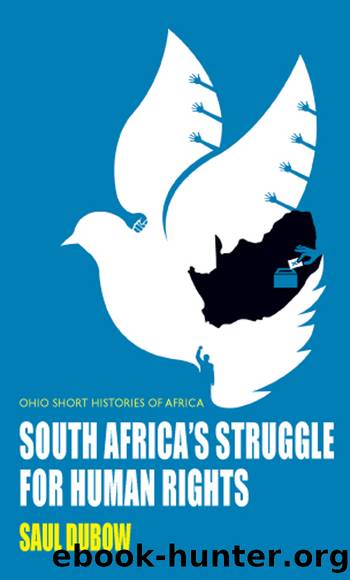South Africa's Struggle for Human Rights by Saul Dubow

Author:Saul Dubow [Dubow, Saul]
Language: eng
Format: epub
Tags: History, Africa, General, Political Science, Human Rights
ISBN: 9780821444405
Google: AuJZnNIdi0EC
Publisher: Ohio University Press
Published: 2012-09-07T16:03:50+00:00
9
The embrace of human rights
The efflorescence of human rights organisations in South Africa during the 1970s and 1980s was closely associated with the rise of civil society and non-governmental institutions. These anti-apartheid bodies tended to operate largely independently of mainstream (and banned) political organisations like the ANC, which, as we shall see, was itself beginning to work in parallel on constitutional and rights issues. Some anti-apartheid organisations within the country adopted human rights for pragmatic reasons, while others were fully committed to its core principles or became so over time. In the mid-1980s many such organisations became affiliated to the United Democratic Front (UDF), a broad-front civic and populist supra-body that helped to reintroduce ANC or âCharteristâ traditions into South Africa at a time of growing social crisis and open mass resistance.
At the opening meeting of the UDF in August 1983, Allan Boesak, a well-known Cape Town activist and preacher, swept the crowd into a rapturous callâresponse chant: âWe want all of our rights, we want them here, and we want them now!â132 This invocation of ârightsâ, whose oratory and cadence consciously evoked the civil rights language of Martin Luther King, was primarily geared towards mass resistance. It also contained within it a strong claim to democratic political rights, not least because the UDFâs formation was initially focused on opposition to P.W. Bothaâs tricameral constitution and the need for a national convention to fashion a constitution based on the âwill of the peopleâ.133 The rights rhetoric of the 1980s therefore operated at two levels, which were sometimes in tension with one another. In the first place, the discourse was oriented to the strategic recovery of political space in a country that was in the midst of a new phase of serious government repression. As such, the language of rights was deployed to delegitimise the regime and apartheid (long seen as a crime against humanity) as well as to defend individuals who suffered from abuses such as detention without trial, state-sponsored killings and torture during the successive states of emergency imposed from 1985 onwards. Secondly, the language of rights addressed concerns about the denial of citizenship and political freedoms and, in doing so, pointed to the urgent demand for a unitary South Africa based on non-racial, democratic principles. By referencing the Freedom Charter, the UDF recalled the more open and pluralist politics of the 1950s.134
Human rights awareness was also becoming more pervasive in the rapidly developing trade union movement, which, by the mid-1980s, was oriented as much towards broad social and political transformation as the furtherance of its membersâ workplace interests. Dunbar Moodieâs analysis of the National Union of Mineworkers shows how, under the leadership of Cyril Ramaphosa, the union foregrounded demands for the recognition of human dignity â or workersâ rights â so as to fundamentally challenge the racist underpinnings and dehumanisation of the industrial process.135 The lived experience of campaigns against the violation of legal rights, coupled with a spirited assertion of racial equality (or non-racism), meant that concepts of rights gained currency for ordinary people involved in the anti-apartheid struggle.
Download
This site does not store any files on its server. We only index and link to content provided by other sites. Please contact the content providers to delete copyright contents if any and email us, we'll remove relevant links or contents immediately.
| Central Africa | East Africa |
| North Africa | Southern Africa |
| West Africa | Algeria |
| Egypt | Ethiopia |
| Kenya | Nigeria |
| South Africa | Sudan |
| Zimbabwe |
Goodbye Paradise(2971)
Men at Arms by Terry Pratchett(2408)
Tobruk by Peter Fitzsimons(2064)
Pirate Alley by Terry McKnight(1910)
Arabs by Eugene Rogan(1837)
Borders by unknow(1789)
Belonging by Unknown(1472)
The Biafra Story by Frederick Forsyth(1325)
It's Our Turn to Eat by Michela Wrong(1305)
Botswana--Culture Smart! by Michael Main(1238)
A Winter in Arabia by Freya Stark(1225)
Gandhi by Ramachandra Guha(1196)
Coffee: From Bean to Barista by Robert W. Thurston(1182)
Livingstone by Tim Jeal(1152)
The Falls by Unknown(1142)
The Source by James A. Michener(1135)
The Shield and The Sword by Ernle Bradford(1101)
Egyptian Mythology A Fascinating Guide to Understanding the Gods, Goddesses, Monsters, and Mortals (Greek Mythology - Norse Mythology - Egyptian Mythology) by Matt Clayton(1088)
Africa: Altered States, Ordinary Miracles by Richard Dowden(1078)
